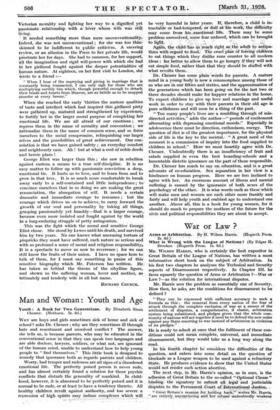War or Law ?
Arms or Arbitration. By H. Wilson Harris. (Hogarth Press.
What is Wrong with the League of Nations ? (By Edgar H.
Brookes. (Hogarth Press. Is. 8d.) '
MR. WILSON HARRIS, who is certainly the'beit expositor in Great Britain of the League of Nations, has written 'a most informative short book on the subject of -Arbitration. In his first two chapters he analyses the Technical and Security aspects of Disarmament respectively. In Chapter III. he faces squarely the question of Arms or Arbitration ?—War or Law ?—as the solution for international disputes.
Mr. Harris sees the problem as essentially one of Security. How then, he asks, are the conditions for disarmament to be defined
" They can.. be expressed with sufficient accuracy in such a formula as this : the removal froth every nation Of the fear of attack through the complete exclusion of war -as a means of the settlement of disputes, a comprehensive, if elastic, arbitration system being substituted, and pledges given that the whole com- munity of nations will act together if need be to defend the new order against any State resorting to war instead of arbitration in violation of its pledges."
He is ready to admit at once that the fulfilment of these con- ditions could not mean coinplete, universal, and immediate
disarmament, but they would take us a long way along the
road.
In 'his fourth chapter he considers the difficulties of the question, and enters into some detail on the question of
blockade as a League weapon to be used against a refractory State. He produces evidence to show that the United States would not render suchactiOn abortive.
The next step, in Mr. Harris's opinion, as in ours, is the adhesion of Great Britain to the so-called "Optional Clause" bin ding- the signatory to submit all legal and justiciable dispute& to the Permanent ,Court of International-Justice,
Great Britain's reasons_ "or_ holding back," writes Mr. Harris, "are entirely unconvincing and her refusal undoubtedly weakens
the prestige of an institution capable of doing more than any other to make law the arbiter in workteelationships as it is in the relation- ships of citizens within a State. It has another effect more unfor- tunate _still.- The force of example in such matters is great. If Great Britain signed and ratified the Optional Clause many States would follow her lead. And even-if it ke argued that Great Britain can be relied on to take the right course without binding herself to do it, there" is no doubt that hei indetion,provides a wglcome excuse for a number of less dependable countries which it is most desirable to commit definitely to the acceptance of the Couit's jurisdiction."
Would that public opinion in this country would arouse itself to make the demand for signature so great that no Government could refuse it. The second step for us to take is, of course, the conclusion of all-in arbitration treaties. No student of the League of Nations-and we should all be that if we value the peace of the world-can afford to neglect this book : it is small in size, but great in importance.
Dr. Brookes, a Professor of Political Science at Pretoria, makes a very clear and cogent criticism of the twin tendencies of the League-the Continental view, of a politico-diplomatic body enforcing their decisions, in the last resort, by force of arms, and the " Anglo-American " view of moral suasion sustained if necessary by economic pressure. The one side desire peace, if possible with justice ; the other (in which is included Great Britain) justice, if possible with peace.
. His idea of reconciling these divergencies is not very con- vincing ; he would have the Assembly and the International Court as the world authority, with a modified Council, such as the present one, as the arbiter for European affairs. There is some logic in the proposal and a good deal of sense ; none the less we believe it would be unworkable.



































 Previous page
Previous page